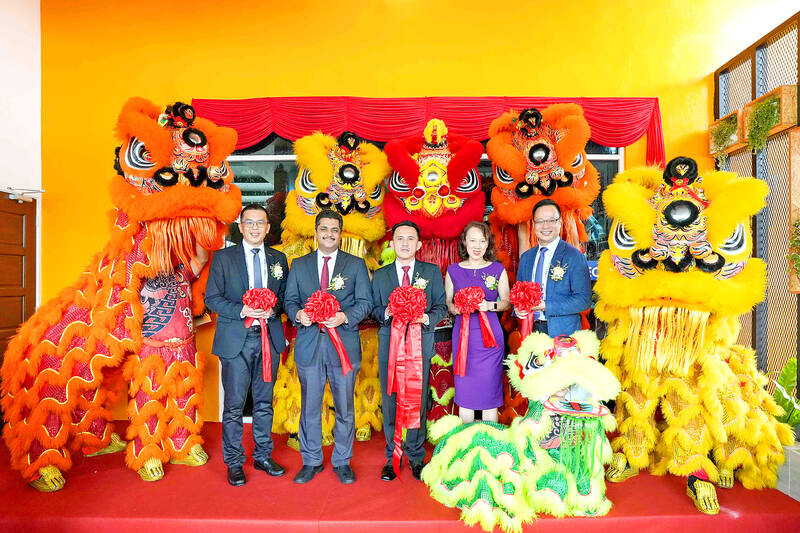Industrial PC maker Advantech Co (研華) yesterday said it has launched its ASEAN Shared Service Center (ASSC) in Penang, Malaysia, as the company steps up efforts to target the Asia-Pacific region in shift from China.
“The establishment of ASSC in Penang signifies the company’s initial phase in implementing the ‘China Plus One’ strategy,” Advantech managing director for Asia and intercontinental region Vincent Chang (張敏忠) said in a statement.
The company’s goal is to support industrial users in project implementation and in-depth development, while also reinforcing regional core competencies and localized services, Chang said.

Photo courtesy of Advantech Co
“Penang, dubbed as the ‘Silicon Valley of the East’ and rich in multicultural talent, was selected for this purpose,” he said.
Along with the establishment of ASSC, the company signed a letter of intent with Piacom JSC, a system integrator affiliated with Vietnamese petroleum group Petrolimex, to offer complete solutions — covering both software and hardware — for the gas station industry in the region, Chang said.
In addition to delivering repair and maintenance services to regional customers, project integration and technical consultation, ASSC operates two production lines for product assembly, Advantech said.
The company said the center mainly caters to customers in Southeast Asian countries such as Thailand, Vietnam and Indonesia.
The center would also assist customers in other Asia-Pacific markets, supporting them with digital transformation and artificial intelligence of things (AIoT) technology in Pakistan and the Philippines, it added.
Advantech yesterday also launched a “University Co-Creation Worldwide Expansion Plan” (UCC) as it aims to forge industry-academia collaboration, promote localized services and create a complete talent development ecosystem in the Asia-Pacific region.
The UCC plans to launch 12 AIoT laboratories in the next two years in cooperation with colleges and universities worldwide, the company said.
Advantech, the first regional industrial PC vendor dedicated to smart cities and the Internet of Things, saw consolidated revenue last year drop 6.08 percent year-on-year to NT$64.57 billion (US$2.06 billion), as the company faced multiple challenges from high global inflation, geopolitical conflicts and uncertainties regarding the recovery of China’s economy.
Japan was the best-performing market last year with 10 percent growth annually, while Taiwan, China and emerging markets registered double-digit percentage declines, and North America and Europe single-digit percentage falls, company data showed.
This year, the company expects a return in growth and looks at operational efficiency optimization in the short term, driven by new orders for emerging IoT applications and deployment for new markets in the second half of the year, it said.

Quanta Computer Inc (廣達) chairman Barry Lam (林百里) is expected to share his views about the artificial intelligence (AI) industry’s prospects during his speech at the company’s 37th anniversary ceremony, as AI servers have become a new growth engine for the equipment manufacturing service provider. Lam’s speech is much anticipated, as Quanta has risen as one of the world’s major AI server suppliers. The company reported a 30 percent year-on-year growth in consolidated revenue to NT$1.41 trillion (US$43.35 billion) last year, thanks to fast-growing demand for servers, especially those with AI capabilities. The company told investors in November last year that

Intel Corp has named Tasha Chuang (莊蓓瑜) to lead Intel Taiwan in a bid to reinforce relations between the company and its Taiwanese partners. The appointment of Chuang as general manager for Intel Taiwan takes effect on Thursday, the firm said in a statement yesterday. Chuang is to lead her team in Taiwan to pursue product development and sales growth in an effort to reinforce the company’s ties with its partners and clients, Intel said. Chuang was previously in charge of managing Intel’s ties with leading Taiwanese PC brand Asustek Computer Inc (華碩), which included helping Asustek strengthen its global businesses, the company

Taiwanese suppliers to Taiwan Semiconductor Manufacturing Co. (TSMC, 台積電) are expected to follow the contract chipmaker’s step to invest in the US, but their relocation may be seven to eight years away, Minister of Economic Affairs J.W. Kuo (郭智輝) said yesterday. When asked by opposition Chinese Nationalist Party (KMT) Legislator Niu Hsu-ting (牛煦庭) in the legislature about growing concerns that TSMC’s huge investments in the US will prompt its suppliers to follow suit, Kuo said based on the chipmaker’s current limited production volume, it is unlikely to lead its supply chain to go there for now. “Unless TSMC completes its planned six

Power supply and electronic components maker Delta Electronics Inc (台達電) yesterday said it plans to ship its new 1 megawatt charging systems for electric trucks and buses in the first half of next year at the earliest. The new charging piles, which deliver up to 1 megawatt of charging power, are designed for heavy-duty electric vehicles, and support a maximum current of 1,500 amperes and output of 1,250 volts, Delta said in a news release. “If everything goes smoothly, we could begin shipping those new charging systems as early as in the first half of next year,” a company official said. The new